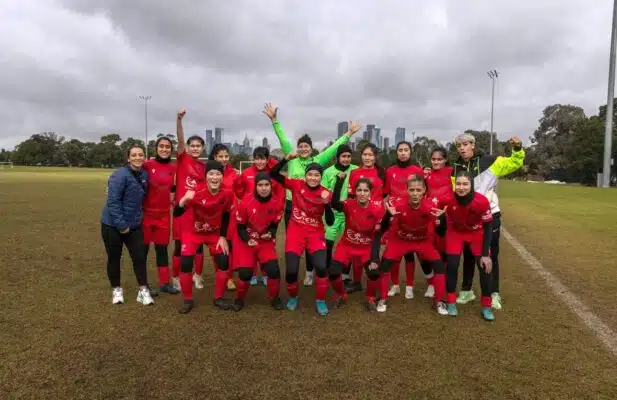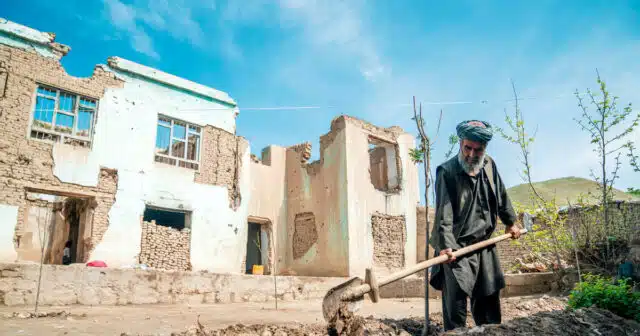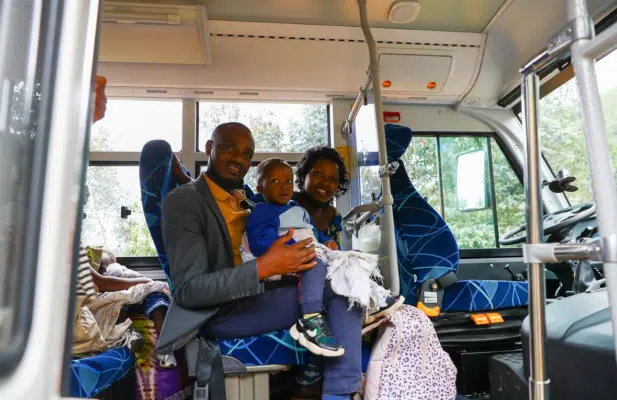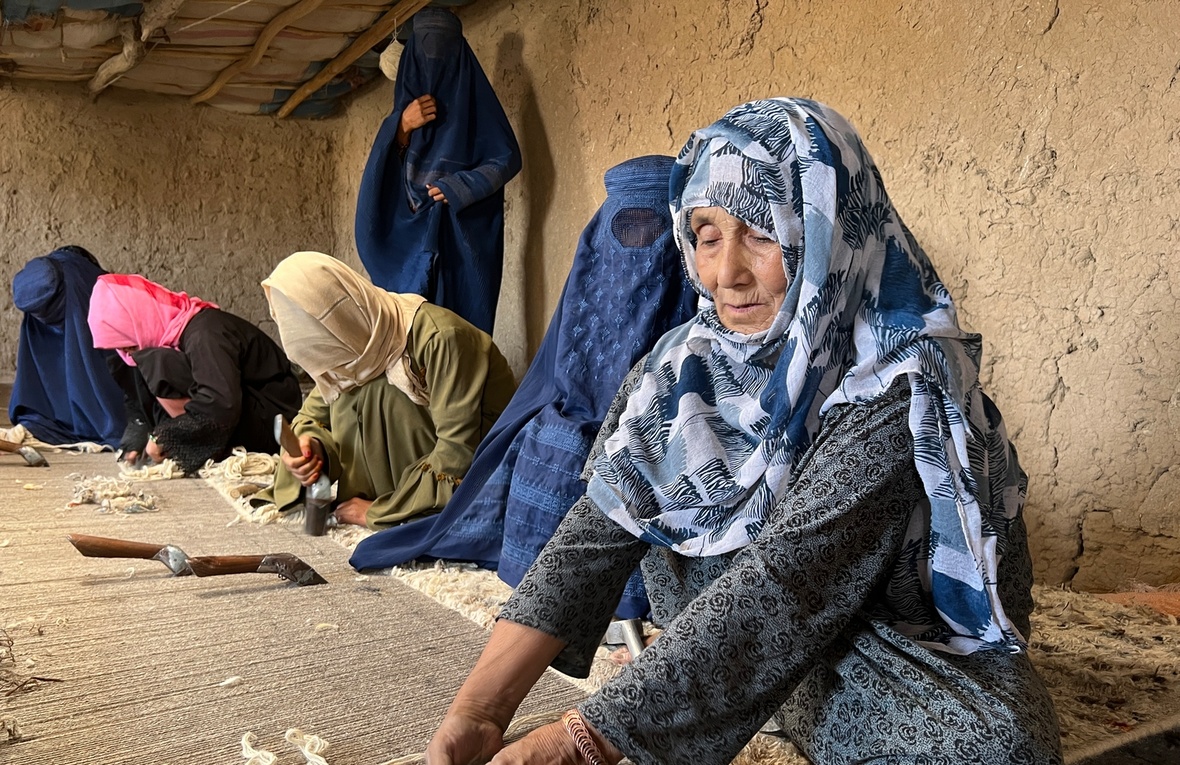
Women from several different households in Qaleen Bafan township work on a carpet together in a mud-built hut. © UNHCR/Caroline Gluck
A UNHCR-supported carpet weaving and processing centre will provide new jobs and better working conditions for former refugee and displaced Afghan women
By Caroline Gluck in Balkh Province, northern Afghanistan
In a dimly lit mud clay hut, a group of seven women are sitting cross-legged and hunched over a large wooden loom on the floor, weaving a woollen carpet.
It will take the women two months to complete this carpet and they will likely earn around 16,000 Afghanis ($185) for their collective efforts. “Normally, eight of us work here,” said 71-year-old Bibi Niaz, who began weaving at the age of 10. “But often, someone is sick, like today. When it is hot, it is hard; my back and shoulders often hurt.”
She added that weaving carpets here in the winter was even harder and that they had to cover the windows with plastic and build a fire to warm their hands.
“I have breathing problems now because of the carpets; I often cough a lot,” she said.
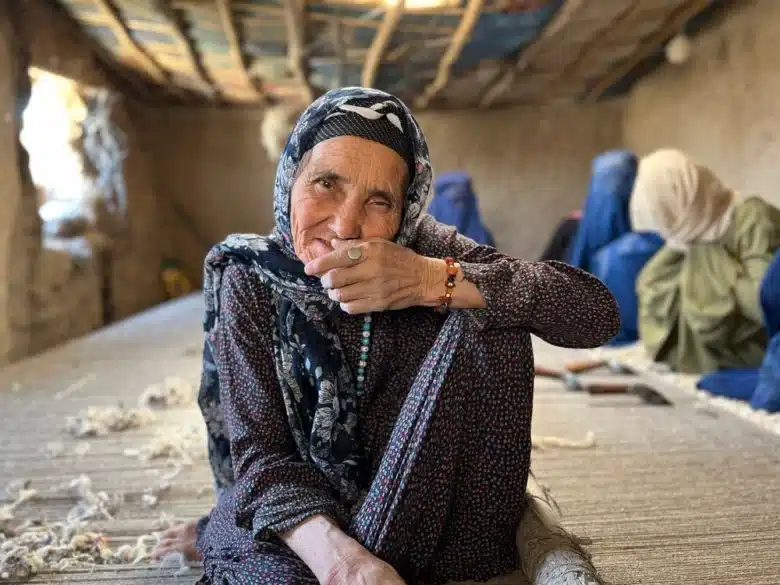
Bibi Niaz, 71, has been weaving carpets since she was 10 years old. © UNHCR/Caroline Gluck
She added that weaving carpets here in the winter was even harder and that they had to cover the windows with plastic and build a fire to warm their hands.
“I have breathing problems now because of the carpets; I often cough a lot,” she said.
Weaving provides work for women confined to homes
Traditional Afghan cultural practices, as well as more recent restrictions affecting women’s ability to travel, study and work, have meant that more women than ever are confined to labour activities at home. Some have taken up carpet weaving to help support their families and feel less isolated.
One of the weavers working alongside Bibi Niaz is 18-year-old Saleha. She was a Grade 8 student with hopes of becoming a nurse when her dreams were shattered two years ago by the de facto authorities’ ban on girls pursuing secondary and further education. “There is no other way to earn money now,” she said. “The closing of schools meant I was at home, and I prefer to keep myself busy through this activity.”
Every family in this township of Qaleen Bafan (meaning “Carpet Weaver”) in northern Afghanistan is involved in making carpets in some way. Most are former refugees who were living in Pakistan and Iran or were displaced to other parts of Afghanistan. Under a government Land Allocation Scheme in 2006, land plots were provided to landless refugees with carpet weaving skills to settle here.
The township and two other nearby sites housing refugee returnees and internally displaced people (Sakhi Camp and Ferdawsi) have since been designated by UNHCR, the UN Refugee Agency, as a Priority Area of Return and Reintegration (PARR), one of 80 areas where UNHCR works with partners and sister UN agencies to improve access to basic services, with the aim of building more resilient communities and reducing the likelihood of further displacement.
New centres to provide jobs
Following an assessment by the International Labour Organization, which identified carpet weaving as a sector with strong potential for growth and economic empowerment of women, UNHCR supported the building of a carpet weaving centre and a carpet processing centre here. Both are due to open in September and have created excitement and hope that conditions for the township’s mainly women carpet weavers may soon improve.
The centres are expected to create around 30 new jobs and will also help the weavers negotiate higher prices for their finished work.
Currently most carpets woven by women in their homes are ordered by middlemen, who provide rural households with the designs, raw materials and often loan or rent out the looms. Weavers are paid for their work according to the carpet size and complexity of the design. However, it is estimated that more than 80 per cent of handwoven carpets are exported to Pakistan for cutting, washing, drying and stretching because of limited access to these facilities in Afghanistan. Only after processing does the skill and beauty of the weave become apparent, allowing the seller to demand premium prices for the carpets, which are highly-prized and sold internationally.
“It will have a dramatic impact and help to support families to have a better income,” said former refugee Haji Gheyas, 62, a community leader in Qaleen Bafan, whose wife is a weaver. “This area is famous for carpet weaving, and we hope we can export to other countries.”
Weathering an economic crisis
The plan is for profits from the centre to be ploughed back into community development. A similar project to establish local carpet processing facilities is also underway in another UNHCR PARR area in Aqcha district, Jawzjan province, northern Afghanistan.
In other PARR areas, UNHCR has provided livelihood support and training opportunities – from beekeeping and poultry farming, to tailoring and sewing projects – to help struggling rural communities, and women in particular, weather an economic crisis affecting the entire country.
An April studyLink is external by the UN Development Programme found that Afghanistan’s economy had contracted by more than 20 per cent since the de facto authorities took over in August 2021. It predicted that restrictions on women’s rights, including education and working opportunities, would result in reductions in international humanitarian aid, worsening the already-dire economic situation.
“It will have a dramatic impact and help to support families to have a better income”
Haji Gheyas, 62, former refugee
The mostly women and girls engaged in weaving in Qaleen Bafan, rely on the meagre amounts they make to support entire families and often get into debt, buying food on credit until the carpets are finished.
Bibi Niaz complained about the rising food prices and lack of alternatives for earning an income. “If there is no carpet weaving, we have no food, there is nothing.
“We need to buy flour, rice, oil, tea and all other needs,” she said.
“I will continue weaving carpets as long as my eyes support me, until the end of my life.”
Originally published by UNHCR on 25 August 2023.



